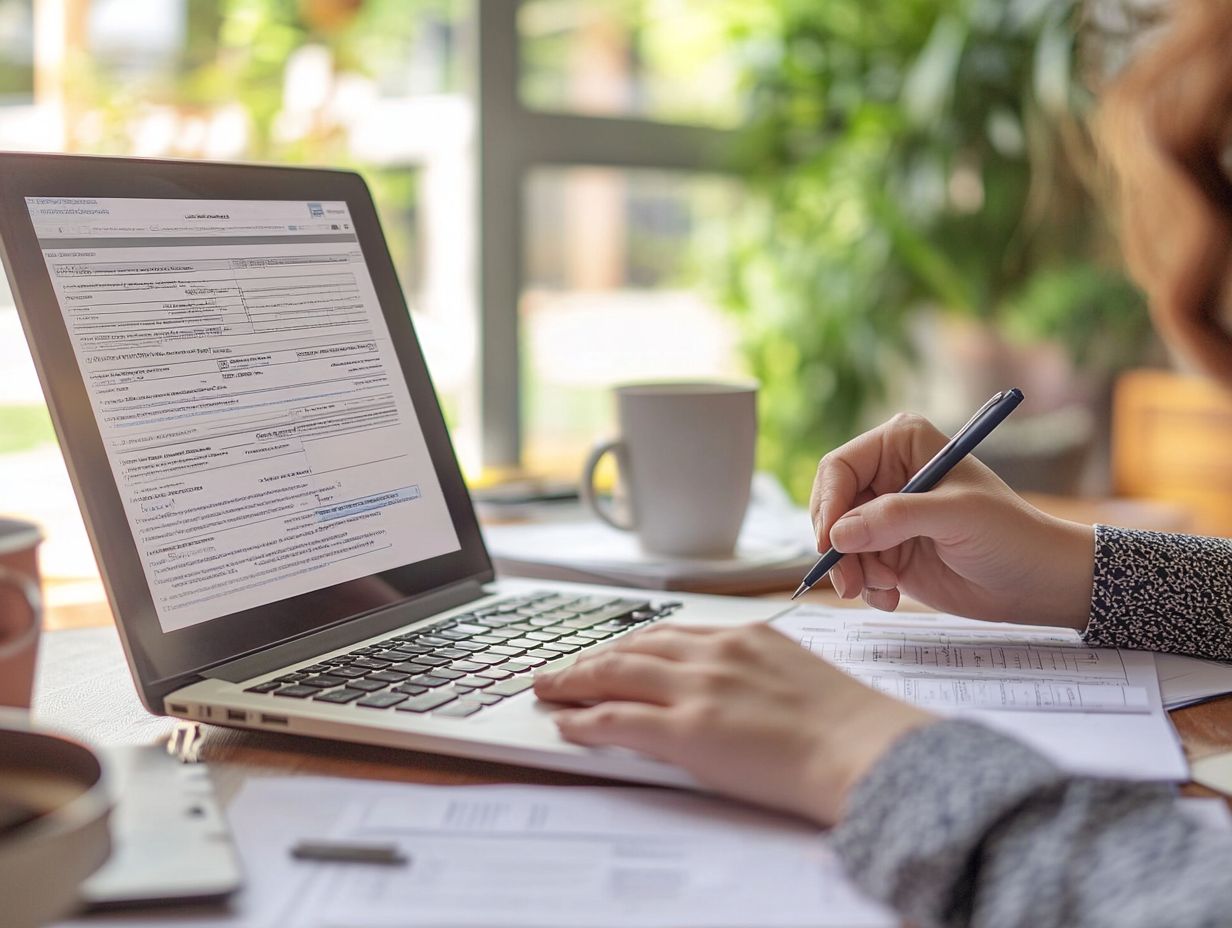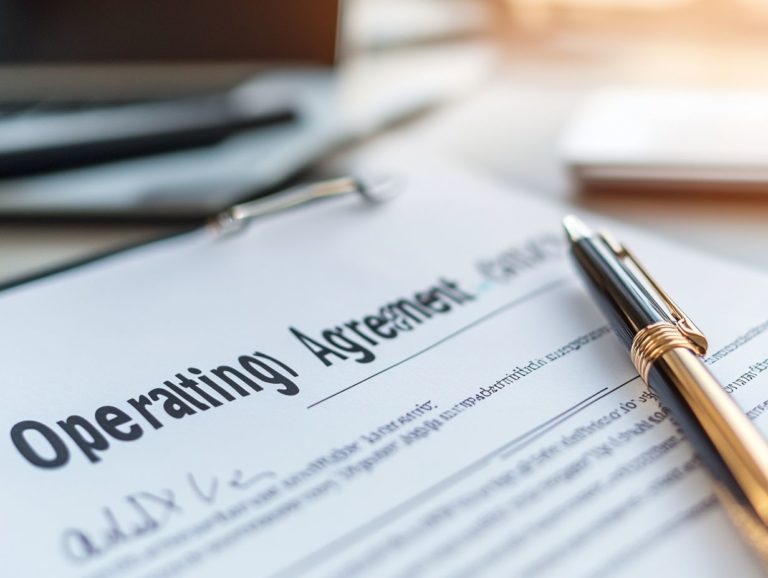How to File for a Business License
Navigating the world of business licenses may seem daunting. However, understanding their significance is key for entrepreneurs. A business license not only legitimizes your venture but also ensures compliance with local laws.
This article clarifies the essentials: what a business license is, why you need one, and the types available. You ll be guided step-by-step through the application process, renewal requirements, and common pitfalls to avoid.
Equip yourself with the knowledge necessary to operate both legally and successfully.
Contents
- Key Takeaways:
- Understanding Business Licenses
- Types of Business Licenses
- Steps to File for a Business License
- Renewing and Maintaining Your Business License
- Common Mistakes to Avoid
- Frequently Asked Questions
- How do I file for a business license?
- What are the requirements for filing a business license?
- How long does it take to get a business license?
- Do I need a business license if I am operating an online business?
- What happens if I don’t file for a business license?
- Can I file for a business license online?
Key Takeaways:

- Be aware of the different types of business licenses (industry-specific and general) that may apply to your business.
- Research and gather all necessary information before starting the application process to avoid delays or mistakes.
- Stay updated on deadlines and requirements for renewing your business license to avoid penalties and fines.
Understanding Business Licenses
Knowing about business licenses is key for anyone starting or running a business in the United States. These licenses are legal permits given by government authorities at various levels (federal, state, and local) that allow you to run certain activities.
Depending on your business type and location, you may need different licenses. For example, if you re opening a restaurant, you’ll likely need an Alcohol Beverage Commission license. Agricultural ventures might need permits from the U.S. Department of Agriculture.
Understanding these licenses helps ensure compliance and protects your investment and future ambitions.
What is a Business License?
A business license is your official ticket to legally run certain activities in your area. This important document shows that you re following local regulations and meeting necessary legal standards. Without it, you could face penalties or even a shutdown.
Don t stop at just a general business license; you may also need permits like:
- Health permits
- Zoning permits
- Professional licenses
These permits legitimize your operations, build trust with customers, and ensure public safety by following ethical guidelines.
Why Do You Need a Business License?
Obtaining a business license is crucial for legal compliance. It ensures that your business aligns with federal, state, and local regulations, protecting you from legal challenges and penalties.
Neglecting to secure the necessary licenses can lead to serious consequences, including fines, shutdowns, or even criminal charges. Industries like healthcare, food service, and construction often have strict licensing requirements. For example, restaurants must follow health codes and obtain health permits.
Having the right licenses is also vital for securing liability insurance, which protects you from unexpected issues or claims. This safeguard provides peace of mind for you and your customers.
Types of Business Licenses
There are numerous types of business licenses, each designed to meet the specific needs of your business activities. These licenses follow various industry requirements and regulations to ensure compliance.
Industry-Specific Licenses
Industry-specific licenses are crafted for particular sectors, ensuring you comply with the unique regulations and standards of practice governing your field.
These licenses play a pivotal role in maintaining safety and efficiency across various industries. For instance, if you re in the food services sector, obtaining a food handler’s permit is your ticket to demonstrating adherence to health and safety codes monitored by agencies like the Food and Drug Administration (FDA).
Similarly, if you’re in transportation logistics, you need specialized permits from authorities like the Department of Transportation (DOT) to ensure your operations remain within safe parameters.
In agriculture, licenses issued by the Environmental Protection Agency (EPA) are essential for regulating pesticide use, protecting both the environment and public health. These licenses help you meet rules and build consumer trust in the quality of your services.
General Business Licenses

General business licenses are essential for most operations and act as the foundational permit you need to legally run your business.
These licenses differ based on your business structure whether you’re a sole proprietor, part of a partnership, established as a corporation, or operating as a limited liability company. Each structure has its own set of legal obligations and local regulations dictating the specific licenses and permits necessary for compliance.
For example, if you re starting a food service business, you ll likely need not just a general license but also health permits. A retail store might require zoning permits, which ensure your business location meets local land use regulations.
Getting the right licenses is key to your business success! It ensures you re compliant with local laws and boosts your credibility, instilling confidence in your customers while setting the stage for a successful business venture.
Steps to File for a Business License
Filing for a business license requires navigating several essential steps that guarantee you fulfill all necessary requirements and adhere to local regulations. Each step is crucial in establishing a solid foundation for your business, ensuring you operate within the legal framework and set yourself up for success.
Research and Gather Necessary Information
The first step in applying for a business license is to conduct thorough research and gather all the necessary information related to your proposed business activities.
This means identifying the specific licenses required for your industry, as different sectors and locations demand unique permits and regulations. Don t wait! Quickly pinpoint the issuing agency responsible for overseeing these licenses, which often varies by state or municipality.
Exploring their official websites or reaching out directly can provide clarity on applications, fees, and timelines. Understanding the financial resources essential for compliance is critical, as license fees, renewal costs, and potential fines can significantly impact your budget.
Adequate financial planning ensures you remain compliant without straining your operational finances.
Complete and Submit Application
Once you ve gathered all the necessary information, the next step is to complete and submit your business application as part of the licensing process.
This step is crucial because ensuring accuracy in the information you provide is key to complying with state and local regulations, which can vary widely. Small errors can lead to frustrating delays or even outright rejections, jeopardizing your ability to operate legally.
You must grasp the essential compliance requirements such as the necessary documentation, fees, and any specific local ordinances you need to follow. When navigating the licensing portal for your state or agency, take the time to review all sections thoroughly.
Many portals include valuable guidance and FAQs that can assist you throughout the submission process.
Ready to start your business? Let s get those licenses sorted out today!
Pay Fees and Obtain License
After you submit your business application, the final step is to pay any necessary fees to obtain your business license from the issuing agency.
To navigate this process seamlessly, it s crucial for you to familiarize yourself with the types of licenses relevant to your business. Fees can vary significantly based on your industry and location. Typically, the issuing agency will provide a detailed breakdown of the fees associated with each license type on their website or upon request. You ll find that various payment methods are accepted, ranging from credit cards to checks or online payment platforms. It s wise to select the most convenient option for your circumstances.
Once you ve settled the fees, you can generally expect to receive your license within a few days to a few weeks. The timeframe depends on the agency s processing times and any additional requirements they may have.
Renewing and Maintaining Your Business License
Renewing and maintaining your business license is essential for ensuring that you remain in full compliance with local regulations and licensing requirements. This proactive approach safeguards your operations and enhances your credibility within the community.
By staying informed about your licensing obligations, you show your commitment to professionalism and responsible business practices.
Renewal Process and Deadlines

The renewal process for your business license has specific deadlines. Paying close attention to these will help you avoid penalties.
If you don t navigate this renewal properly, you risk disruptions in your operations, increased fees, and even potential legal issues. Typically, you ll receive notifications well in advance of your license expiration date, giving you plenty of time to prepare.
Staying informed about these timeframes is crucial, as they can vary by jurisdiction. You may need to submit certain documentation or fees within a specified period.
Don t ignore these alerts! Delaying your renewal can cause serious setbacks. Managing your license expiration proactively is essential to maintain compliance and ensure that your business runs smoothly without unnecessary interruptions.
Compliance and Updating Information
Maintaining compliance requires you to regularly update information related to your business operations. This ensures that all licenses remain valid and accurate. This vigilance protects your enterprise from potential legal complications and fosters trust with clients and partners.
When changes occur in your business structure, ownership, or operational procedures, it’s essential to promptly inform the appropriate issuing agency. Taking proactive steps to communicate these updates helps streamline processes and minimizes the risk of penalties.
Whether you choose to send a formal letter, submit information online, or make a phone call, clear and concise communication is vital for maintaining the integrity of your business standing.
Common Mistakes to Avoid
When navigating the licensing landscape (the various requirements and licenses you need to operate legally), it s crucial to be aware of the common missteps that many businesses encounter. Avoid these errors to keep your business safe from complications and legal issues.
Not Obtaining Necessary Licenses
One of the most significant missteps you can make as a business is neglecting to obtain the necessary licenses required for legal operation.
This oversight can usher in severe consequences, including hefty fines, legal battles, and the potential shutdown of your operations. In industries like healthcare, where patient safety is non-negotiable, failing to secure the appropriate medical licenses can endanger your business’s reputation and public health.
Similarly, in the hospitality sector, operating without the proper food and beverage permits can lead to health code violations. This puts your customers safety at risk and exposes you to substantial financial penalties. Such oversights underscore the critical importance of compliance, reminding you that the costs of ignoring licensing requirements far exceed the initial investment needed to secure them.
Failure to Renew or Update Information
Neglecting to renew your business license or failing to update crucial information can lead to significant legal challenges and financial penalties.
Such oversights can jeopardize contracts and limit your business opportunities. They can also result in fines that disrupt your cash flow. Understanding the risks is crucial for your success!
To steer clear of these pitfalls, it s wise to adopt an organized method for tracking renewal deadlines. Keep your business records accurate by implementing reminders, utilizing online tools, and conducting regular audits of your documentation. This approach will help ensure compliance and safeguard the longevity of your operations.
Frequently Asked Questions
How do I file for a business license?

To file for a business license, contact your local government office or visit their website to obtain the necessary forms. You may also need to provide specific information about your business, such as its name, location, and type of business. For a comprehensive overview, check out the steps to register your new business.
Once you have completed the forms and submitted the required fees, your application will be reviewed and processed.
What are the requirements for filing a business license?
The requirements for filing a business license may vary depending on your location and the type of business you are starting. Generally, you will need to provide proof of business ownership, a business plan, and any necessary permits or licenses.
You may also need to undergo a background check and meet certain industry-specific regulations.
How long does it take to get a business license?
The time it takes to receive a business license varies depending on your location and the complexity of your business. In general, it can take anywhere from a few days to several weeks for your application to be processed and approved.
It is best to plan ahead and give yourself enough time to complete the necessary steps for obtaining a business license.
Do I need a business license if I am operating an online business?
In most cases, yes. Even if you are operating an online business, you will still need to file for a business license in the city or state where your business is physically located. This ensures compliance with local laws and regulations.
However, there may be some exceptions for certain types of online businesses, so it is best to check with your local government office for specific requirements.
What happens if I don’t file for a business license?
If you fail to file for a business license, you may face penalties and fines. These can include late fees, interest charges, and even legal action. Operating without a business license can lead to your business being shut down.
It is important to follow all legal requirements and obtain the necessary licenses to ensure the longevity and success of your business.
Can I file for a business license online?
Many local government offices now offer the option to file for a business license online. This makes the process more convenient and saves you time.
However, not all locations may have this option available, so it is best to check with your local government office for their specific procedures and requirements.
Don t wait! Start your business journey today with the right licenses and avoid future headaches!



